Dear brothers and sisters,
Today the Russian Church Outside of Russia celebrates the canonisation of our Holy and Righteous Father, John of Kronstadt, that bright luminary, who shone through the gathering storm clouds and darkness in the last days of the Imperial Russia.
 At the time of the canonisation in 1964, the Church Abroad was the only free part of the Russian Church, with its prophetic voice championing the plight of the martyric suffering of the faithful in the Soviet Union, whilst the Bishops of the Moscow Patriarchate fervently denied the persecution of the Church, especially before western commentators, despite the renewed, savage attacks on the Church under Krushchev, who had died only weeks earlier.
At the time of the canonisation in 1964, the Church Abroad was the only free part of the Russian Church, with its prophetic voice championing the plight of the martyric suffering of the faithful in the Soviet Union, whilst the Bishops of the Moscow Patriarchate fervently denied the persecution of the Church, especially before western commentators, despite the renewed, savage attacks on the Church under Krushchev, who had died only weeks earlier.
Despite its poverty and numerical insignificance, our Russian Church Abroad struggled to preserve the Faith and the legacy of Holy Russia – and continued that life and legacy in exile and the emigration.
It was clear that the Church in captivity could not canonise such a holy and light-bearing spiritual giant as St John, clearly glorified by God among the choir of the Saints in the Heavenly Church. So, in 1964, our Russian Church Outside of Russia, as the free voice of Russian Orthodoxy glorified St John – an event so long awaited by the faithful in the homeland and in the emigration. The Moscow Patriarchate would not declare St John a saint for another twenty six years.
In this event, we not only reflect upon the holiness and awe-inspiring life and ministry of St John, but also on the importance of our Church Abroad in championing and preserving the inheritance and legacy of our Faith, rejecting compromise and the ‘dumbing down’ of Orthodoxy, the perversion of the tenets of Faith to suit nationalistic and political agendas, communion with schismatics, the cancer of ecumenism that still spreads its deathly cells throughout the ‘Orthodox’ world, and the temptation to accommodate the Church to the fallen world, with its politically correct, hellish agendas.
This is why recognising St John up as a beacon of Orthodoxy and holiness was so important in 1964, and remains so important at the present time, when we are surrounded by darkness… but darkness that is dispelled by the light of God’s Glory shining in the lives of His saints and in His Holy Church.
Let us pray to St John for the Church and the suffering-world, and for us to have the courage and strength to tread the Royal Path that leads to the Kingdom of God.
Holy, Righteous Father, John of Kronstadt, pray to God for us!

The Canon to St John of Kronstadt in Tone IV
Ode I, Irmos: Through the deep of the Red Sea, * marched dry shod Israel of old, * and by Moses’ outstretched hands, * raised in the form of a cross, * the power of Amalek was routed in the wilderness.
Holy, Righteous Father, John of Kronstadt, pray to God for us.
Make firm my senses and mind, O my Savior, that I may worthily hymn the supplications and struggles of Thy servant John our father, who loved Thee and was beloved of Thee.
Holy, Righteous Father, John of Kronstadt, pray to God for us.
O blessed one who from thy youth wast forechosen to chant unto the first-called apostle in his holy temple, illumined with the radiance of the Cross thou didst flee the gloom of sin, unceasingly offering up prayers and hymnody to God our Savior.
Glory be to the Father, and to the Son, and to the Holy Spirit.
On a chariot of the virtues didst thou mount to heaven, as once did Elijah on a chariot of fire; hence, beseech thou the Lord that He send down upon us correction of life.
Now and ever, and unto the ages of ages. Amen.
Through thee, O Virgin Theotokos, we who were once deprived of life in paradise have received everlasting life; for thou hast given birth unto Him Who alone is without beginning and giveth life unto all.
Ode III, Irmos: Thy Church, O Christ, rejoiceth in Thee crying aloud: * Thou, O Lord, art my strength, * my refuge and foundation.
Holy, Righteous Father, John of Kronstadt, pray to God for us.
As one who shared in the manner of life of the apostles and wast an emulator of their life, O divinely inspired one, thou didst set forth the word of truth unto the end.
Holy, Righteous Father, John of Kronstadt, pray to God for us.
The eye of thy soul beheld the kingdom of heaven, for it was pure; wherefore, thou didst splendidly set forth thy life, and, honoring it in God, we glorify thee.
Glory be to the Father, and to the Son, and to the Holy Spirit.
Let him who doth not labor not eat! These words of the Apostle Paul didst thou proclaim to thy brethren; wherefore, thou didst raise up a house of industry for the sake of the poor, wherein the impoverished and ailing might be provided for, being sustained by the work of their own hands.
Now and ever, and unto the ages of ages. Amen.
Thou art wholly light, all-goodness, all-wisdom; thou canst, as Mother of the Almighty, do all things; thou alone art all-perfect, in that thou art the Mother of the all-perfect King of glory.
Lord, have mercy. Lord, have mercy. Lord, have mercy.
Sessional Hymn, Tone VIII: O blessed John, lamp of Kronstadt, thou whose activity and preaching were continual, who offered up before the throne of the Most High lamentation over the sins of many, and who in the Spirit beheld the bowing down of the heavens at the holy liturgy: Pray thou on behalf of our souls!
Glory be to the Father, and to the Son, and to the Holy Spirit; now and ever, and unto the ages of ages. Amen.
Theotokion, Tone VIII: O ye faithful, with hymns let us magnify the Theotokos, * the unshakable confirmation of the Faith * and the precious gift of our souls: * Rejoice, thou who didst hold within thy womb the Stone of life! * Rejoice, thou hope of the ends of the earth * and aid of the sorrowful! ** Rejoice, thou Bride unwedded!
Ode IV, Irmos: Beholding Thee, the Sun of righteousness, * lifted up upon the Cross, * the Church now standeth arrayed and doth worthily cry aloud: * Glory be to Thy power, O Lord!
Holy, Righteous Father, John of Kronstadt, pray to God for us.
Having a firm foundation in Christ, thou didst imitate Abraham of old in thy hospitality, receiving those who came to thee from all lands, and leading them to the Lord; and thus didst thou do that which is pleasing unto God.
Holy, Righteous Father, John of Kronstadt, pray to God for us.
Desiring to make thy heart a temple of God, it was thy wish to serve unceasingly in the house of God, adorning thy soul with the beauties of heaven.
Glory be to the Father, and to the Son, and to the Holy Spirit.
Having extinguished all the passions of the body with the dew of thy feats, thou didst kindle the light of dispassion; wherefore, thou wast shown also to be a child of the everlasting day, O blessed father.
Now and ever, and unto the ages of ages. Amen.
The divine Ezekiel, O most pure one, called thee prophetically the gate which was closed, through which He Who alone is pre-eternal hath passed without change, granting His peace.
Ode V, Irmos: Thou, O Lord, who camest into the world, * art my light, * a holy light turning from the darkness of ignorance * those who sing Thy praises in faith.
Holy, Righteous Father, John of Kronstadt, pray to God for us.
Unceasingly serving thy Lord and ever emulating the labors of the apostles, O father, thou wast deemed worthy of heavenly gifts.
Holy, Righteous Father, John of Kronstadt, pray to God for us.
Having slain the passionate pleasures of thy corruptible flesh, thou didst enliven thine incorruptible soul with piety, and make of it a house of the divine Spirit.
Glory be to the Father, and to the Son, and to the Holy Spirit.
Earnestly proclaiming the Gospel of Christ unto all, thou wast a daily communicant at the banquet of the Lord, making thyself and thy flock a living offering which was holy in God’s sight.
Now and ever, and unto the ages of ages. Amen.
O most pure one, thou hast given birth unto One of the Trinity, Who, for the sake of His loving-kindness, appeared on earth in two natures; Him do thou unceasingly entreat, that He save our souls.
Ode VI, Irmos: The church crieth out unto Thee O Lord, * ‘I will sacrifice unto Thee with a voice of praise * having been cleansed of the blood of the demons’ * by the blood that for mercy’s sake flowed from Thy side.
Holy, Righteous Father, John of Kronstadt, pray to God for us.
Thou wast a fruitful olive tree in the house of thy Lord, O divinely manifest John, for the Lord imparted divine knowledge unto thee and strengthened thee in thine apostolic work.
Holy, Righteous Father, John of Kronstadt, pray to God for us.
Ye are the members of the body of Christ! Thus, with the Apostle Paul didst thou preach, teaching thy flock to love Christ alone, that all may be one.
Glory be to the Father, and to the Son, and to the Holy Spirit.
Thy life is holy, thy discourse, O divinely wise one, was filled with the grace of God, and thy heart became a vessel of grace-filled prayer. Wherefore, with faith and love we honor thee.
Now and ever, and unto the ages of ages. Amen.
The angelic hosts marveled at the ineffable wonder which took place within thee, O most holy Virgin; how He Who is incorporeal and sustaineth all things took flesh from thee.
Lord, have mercy. Lord, have mercy. Lord, have mercy.
Glory be to the Father, and to the Son, and to the Holy Spirit; now and ever, and unto the ages of ages. Amen.
Kontakion, Tone IV: O father John, namesake of grace, * who wast chosen by God from childhood, * who in thy youth miraculously received from Him the gift of learning, * and in a dream wast most gloriously called to be a priest: ** Entreat Christ God, that we may all be with thee in the kingdom of heaven.
Ikos: The Holy Spirit Who spake in the prophets and enlightened the whole world through the apostles, Who gave strength to the martyrs and made clear the Orthodox Faith through the holy hierarchs, poured forth His grace abundantly upon thee, O father John; for by thy discourse, by thy works and thy whole life thou didst proclaim the faith of Christ. Wherefore, the Lord hath summoned thee to His habitations; and as thou dost now stand before the throne of His glory, do thou pray that all who honor thee may be with thee in the kingdom of God.
Ode VII, Irmos: In the Persian furnace the youths and descendants of Abraham, * burning with a love of piety * rather than by a flame of fire, * cried aloud saying: * Blessed art Thou in the temple of Thy glory, O Lord.
Holy, Righteous Father, John of Kronstadt, pray to God for us.
By the providence of God thou wast revealed to be a light of piety amid the heavy darkness of godlessness and unbelief, O father, calling upon all to cry aloud: Blessed art Thou in the churches of Thy glory, O Lord!
Holy, Righteous Father, John of Kronstadt, pray to God for us.
Man is formed in the image of God; and thou, O father John, wast a most splendid mirror of the love of God and a dwelling place of the Holy Trinity, Whom we sinners also glorify.
Glory be to the Father, and to the Son, and to the Holy Spirit.
From the Lord didst thou receive the grace to heal the infirmities and passions of all; visit us also therewith always, that with thee we may all chant in oneness of mind: Blessed art Thou, O Lord God, throughout all ages!
Now and ever, and unto the ages of ages. Amen.
O Lady, save thy people, save those who are of the same blood as thee. Save us, O Mother of life and of the whole human race, and, even though we are unworthy to call thee our mother, sanctify, make steadfast and save us by thy supplications.
Ode VIII, Irmos: Having spread his hands, Daniel closed the lions jaws * in their den; * while the zealously pious youths, * girded with virtue, * quenched the power of the fire and cried aloud: * Bless ye the Lord, all ye works of the Lord.
Holy, Righteous Father, John of Kronstadt, pray to God for us.
Cleanse our hearts and thoughts by thy supplications, and show us forth to be fertile ground, that, girded about with virtue, we may cry aloud: Bless the Lord all ye works of the Lord!
Holy, Righteous Father, John of Kronstadt, pray to God for us.
Thou wast crowned with a crown of gifts of grace, contemplating heavenly wisdom and ever crying aloud: Bless the Lord, all ye works of the Lord!
Glory be to the Father, and to the Son, and to the Holy Spirit.
Glory to Thee, O most holy, life-creating Spirit, Who proceedest from the Father and ever restest in the Son! Glory to Thee, O Son of God, Who sanctifiest through the Holy Spirit, and strengthenest and makest us wise! Glory to Thee, O Father, Who art ever well pleased with us through the Holy Spirit! O indivisible Triune Unity, have mercy upon us!
Now and ever, and unto the ages of ages. Amen.
Rejoice, thou who hast given birth to the salvation of the world! for through thee we have been raised up from earth to heaven! Rejoice, O blessed one, thou protection and dominion, rampart and foundation of those who chant: Hymn the Lord, O ye works, and supremely exalt Him throughout all ages!
Ode IX, Irmos: A cornerstone not cut by hand O Virgin, * was cut from thee the unhewn mountain: * even Christ, Who hath joined together the disparate natures; * therefore rejoicing we magnify thee, * O Theotokos.
Holy, Righteous Father, John of Kronstadt, pray to God for us.
Truly thou wast a light to the world, O holy father, for, having adorned thy soul with godly works, thou wast revealed to be an eminent pastor of the Orthodox Church, being a model for the faithful in word and life; wherefore, we bless thee.
Holy, Righteous Father, John of Kronstadt, pray to God for us.
Keeping the One Creator ever before thy mind, through Whom and in Whom all things exist, with a pure heart and guileless soul thou didst labor for Him throughout thy life as thy Lord; and in no wise wast thou bound by Mammon.
Glory be to the Father, and to the Son, and to the Holy Spirit.
Princes praised thee and many people glorified thee; but, disdaining earthly glory, thou didst desire to be in the eternal mansions of God, there to glorify the Lord always.
Now and ever, and unto the ages of ages. Amen.
He Who is pre-eternal descended into thy womb, O most holy Virgin, and ineffably, in a manner transcending comprehension and all telling, was born from thee, that He might renew Adam of old; wherefore, we ever magnify thee as the cause of our renewal.

Troparion, in Tone IV: With the apostles thy sound hath gone forth into all the earth; * with the confessors thou didst endure sufferings for Christ; * thou didst resemble the holy hierarchs in thy preaching of the Word; * and with the venerable hast thou shone forth in the grace of God. * Therefore, the Lord hath exalted the depths of thy humility above the heavens, * and hath given us thy name as a source of most wondrous miracles. * Wherefore, O wonderworker, who livest in Christ forever, * take pity in thy love upon people in misfortunes; * and hearken unto thy children, * who with faith call upon thee, ** O righteous John, our beloved pastor.
Troparion, in Tone IV: O wonderworker, who livest in Christ forever, * take pity in thy love upon people in misfortunes; * hearken unto thy children who with faith call upon thee, * expecting compassionate aid from thee, ** O John of Kronstadt, our beloved pastor.



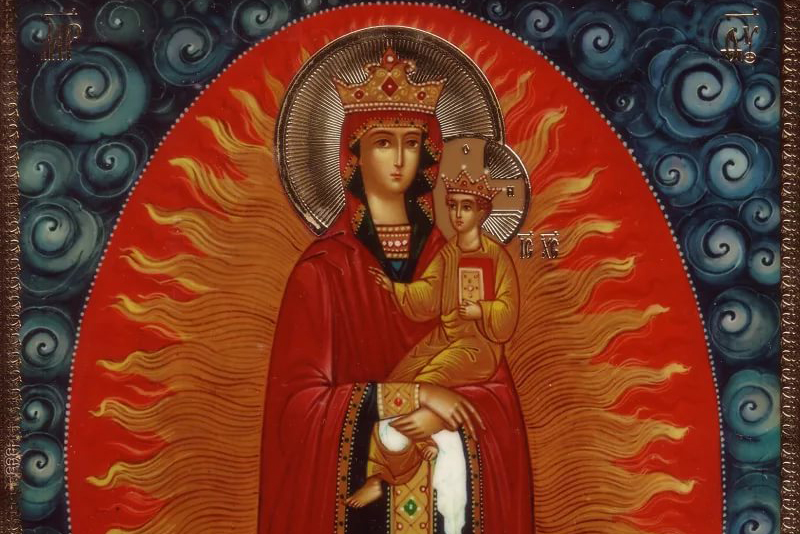
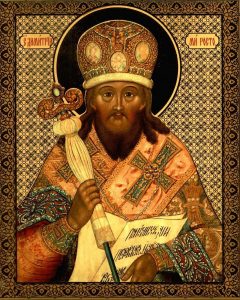
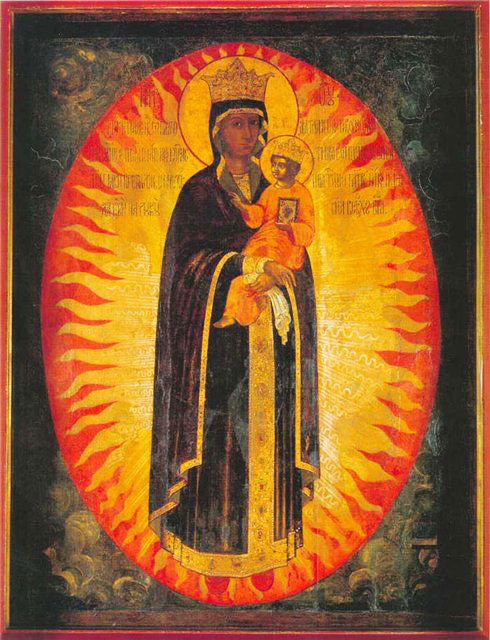
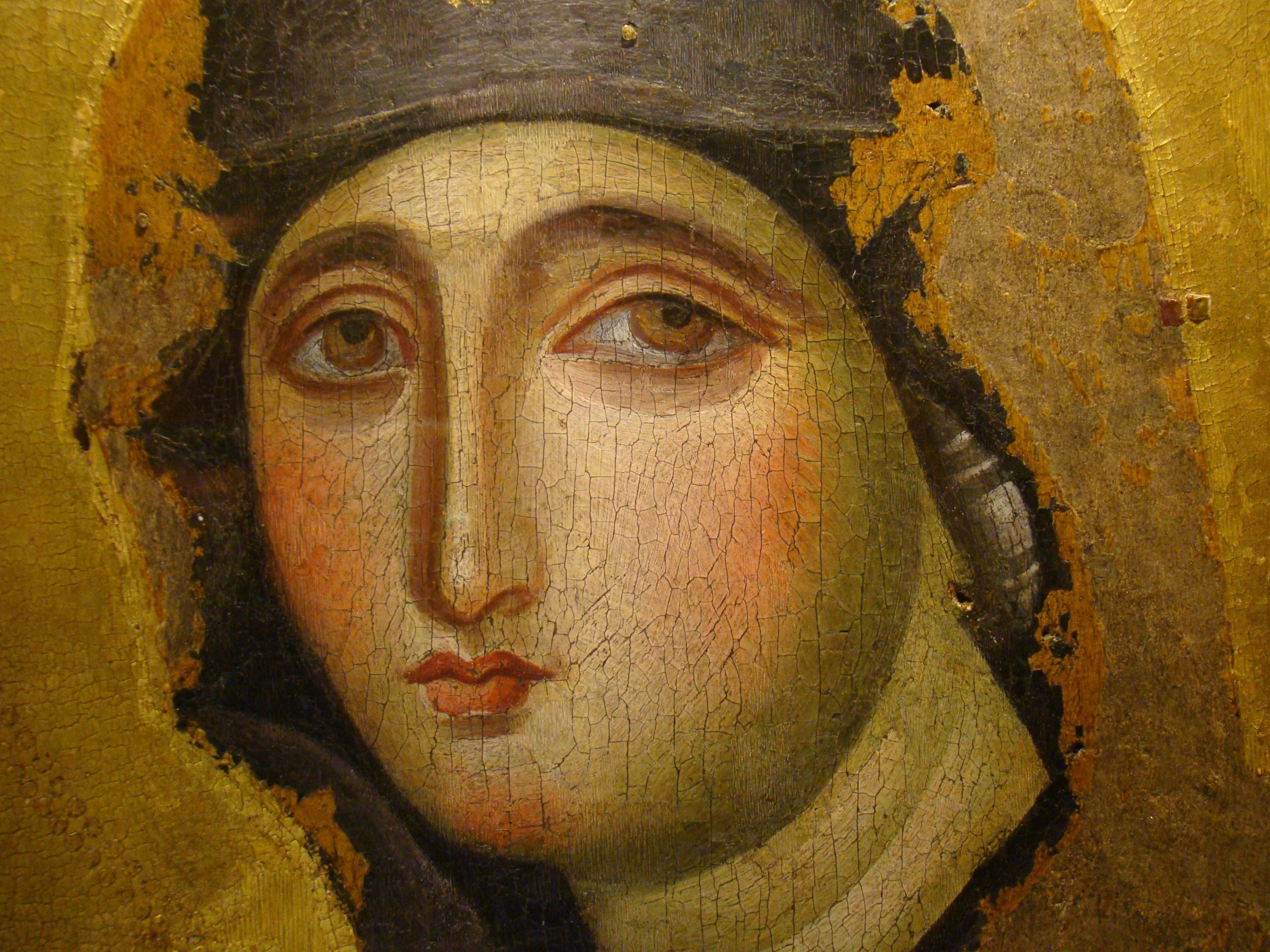
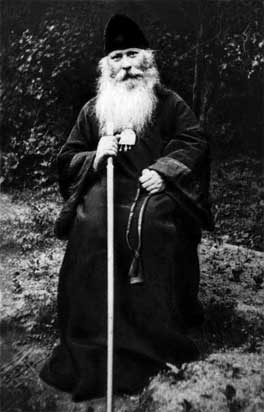 Seraphim instructed his spiritual daughters, the nuns of Diveyevo to keep this prayer rule, reciting it as they walked three times around the ‘canal’ that the Mother of God instructed to be dug around the monastery. For praying the rule they made, and continue to make, a special lestovka with 150 steps, and they continue this devotion in obedience to St Seraphim, and to do so they make a modified version of the traditional Russian leather lestovka (ladder), that is an alternative to prayer ropes and chotki, was used by St Seraphim to recite the Jesus prayer, as we see his icons.
Seraphim instructed his spiritual daughters, the nuns of Diveyevo to keep this prayer rule, reciting it as they walked three times around the ‘canal’ that the Mother of God instructed to be dug around the monastery. For praying the rule they made, and continue to make, a special lestovka with 150 steps, and they continue this devotion in obedience to St Seraphim, and to do so they make a modified version of the traditional Russian leather lestovka (ladder), that is an alternative to prayer ropes and chotki, was used by St Seraphim to recite the Jesus prayer, as we see his icons. 



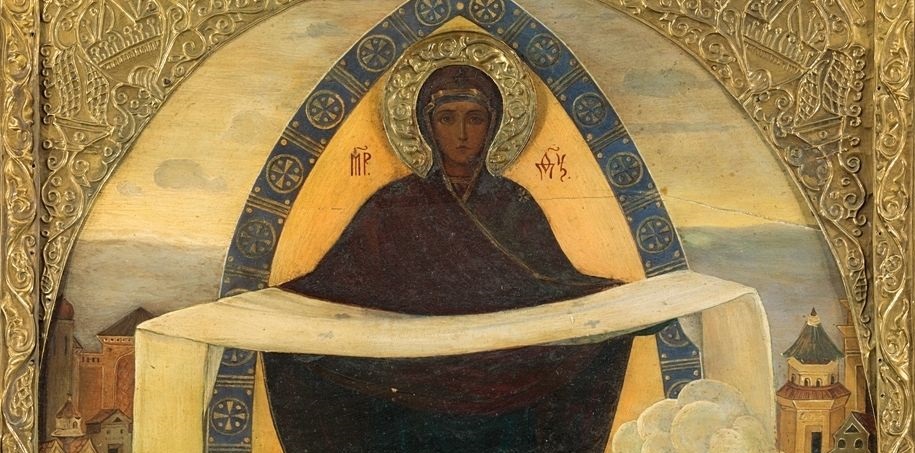
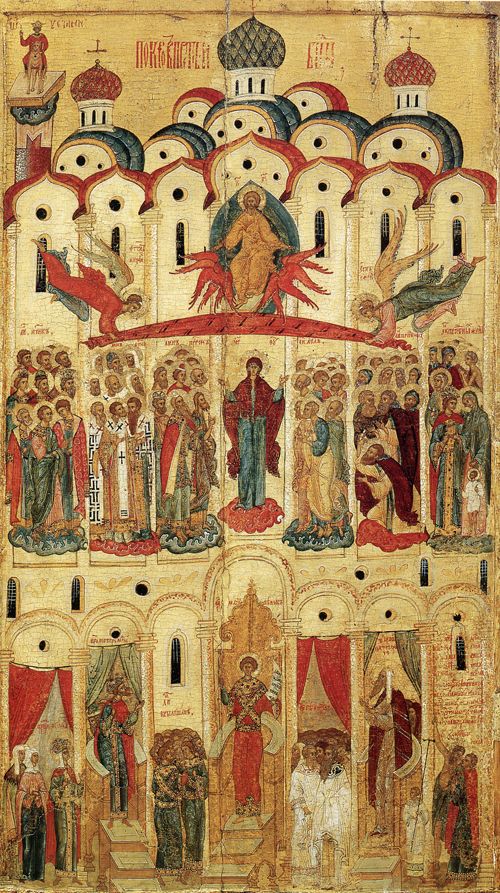 As we look at the icon, we see the Mother of God at the centre of the heavenly Church, flanked by St John the Forerunner and St John the Theologian, surrounded by the throngs of the heavenly powers and saints, interceding for us with the Mother of God, as Queen of Heaven.
As we look at the icon, we see the Mother of God at the centre of the heavenly Church, flanked by St John the Forerunner and St John the Theologian, surrounded by the throngs of the heavenly powers and saints, interceding for us with the Mother of God, as Queen of Heaven.